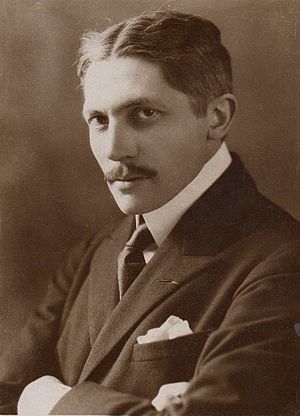Jacques Bainville facts for kids
Quick facts for kids
Jacques Bainville
|
|
|---|---|
 |
|
| Born | 9 February 1879 |
| Died | February 9, 1936 (aged 57) Paris, France
|
| Occupation | historian, journalist |
| Political party | Action Française |
Jacques Pierre Bainville (born February 9, 1879 – died February 9, 1936) was a French historian and journalist. He was very interested in how countries relate to each other, especially France and Germany. He was a key member of a group called Action Française, which supported having a king again in France.
Bainville was worried about Germany becoming too powerful. He strongly spoke out against democracy (rule by the people), the French Revolution, internationalism (countries working closely together), and liberalism (ideas about individual rights and freedoms). A public square in Paris is named after him.
Jacques Bainville's Political Views
Bainville is well-known for his strong opinions about the Treaty of Versailles. This treaty was signed in 1919 after World War I to set the peace terms for Germany. In his book The Political Consequences of Peace (1920), Bainville said the treaty was flawed.
He believed the treaty was "too harsh in its mild features, too mild in its harsh aspects." This meant it was tough enough to make Germany angry, but not tough enough to stop Germany from seeking revenge later. He warned that the treaty would make German states stick together more closely. He also thought it weakened Germany's neighbors, like Austria-Hungary, who could have helped control Germany.
Bainville argued that the treaty created a difficult situation where "40 million Frenchmen have as debtors 60 million Germans." He criticized leaders like Woodrow Wilson and David Lloyd George for not focusing enough on the real-world power struggles between countries.
His Writings and Ideas
Bainville wrote many books, including a History of France. He also wrote political articles for newspapers and edited a magazine. In his book History of Two Peoples (1915), he stressed that France needed Germany to be weak to ensure peace. He admired the Treaty of Westphalia (from 1648) as a good example of how to keep peace in Europe.
Because he was so focused on controlling Germany, he initially liked Italian fascism. When he heard about the actions of Benito Mussolini's group in 1921, he saw it as a sign that Italy was becoming strong again.
Bainville was a follower of Charles Maurras and helped start Action Française. He became an important figure in the group's college, which offered lectures and study groups. By 1900, Bainville had developed strong dislikes for disorder, romanticism, liberalism, democracy, internationalism, the French Revolution, and especially Germany. He also spoke out against Alfred Dreyfus in a famous case.
In 1935, Bainville was chosen to be a member of the Académie française, a very respected French institution. However, his health was poor, and he died soon after. He was a strong Catholic.
Works
- Louis II de Bavière (1900).
- Bismarck et la France (1907).
- Le Coup d'Agadir et la Guerre d'Orient (1913).
- Histoire de Deux Peuples (1915).
- La Guerre et l'Italie (1916).
- Petit Musée Germanique (1917).
- Comment est née la Révolution Russe (1917).
- Histoire de Trois Générations (1918).
- Comment Placer sa Fortune (1919).
- Les Conséquences Politiques de la Paix (1920).
- Ironie et Poésie (1923).
- Filiations (1923).
- Heur et Malheur des Français (1924).
- Histoire de France (1924).
- Le Dix-huit Brumaire (1925).
- Le Salon d'Aliénor (1926).
- Nouveau Dialogue dans le Salon d'Aliénor (1926).
- Polioute (1926).
- L'Allemagne Romantique et Réaliste (1927).
- Le Critique Mort Jeune (1927).
- Au Seuil du Siècle (1927).
- Jaco et Lori (1927).
- Le Vieil Utopiste (1927).
- Petite Histoire de France (1928).
- Couleurs du Temps (1928).
- La Tasse de Saxe (1928).
- Le Jardin des Lettres (1928).
- Une Saison chez Thespis (1928).
- Napoléon (1931).
- Maximes et Réflexions (1931).
- Les Sept Portes de Thèbes (1931).
- Bismarck (1932).
- Louis II de Bavière (1932).
- Les Étonnements de Michou (1934).
- La Troisième République (1935).
- Les Dictateurs (1935).
Posthumous
- Bonaparte en Égypte (1936).
- Lectures (1937).
- La Fortune de la France (1937).
- La Russie et la Barrière de l'Est (1937).
- L'Angleterre et l'Empire Britannique (1938).
- Chroniques (1938).
- Doit-on le Dire? (1939).
- L'Allemagne (1939–1940).
- Comment s'est Faite la Restauration de 1814 (1943).
- Esquisses et Portraits (1946).
- La France (1947).
- Journal: 1901-1918 (1948).
- Journal: 1919-1926 (1949).
- Journal: 1927-1935 (1949).
- Journal Inédit (1953).
Miscellany
- Preface to Mirabeau ou la Révolution Royale, by Herbert Van Leisen (1926).
- Preface to Jomini ou le Devin de Napoléon, by Xavier de Courville (1935).
In English translation
- Italy and the War (1916).
- Two Histories Face to Face, France versus Germany (1919).
- History of France (1926).
- Napoleon (1931).
- The French Republic, 1870-1935 (1936).
- Dictators (1937).
See also
 In Spanish: Jacques Bainville para niños
In Spanish: Jacques Bainville para niños

